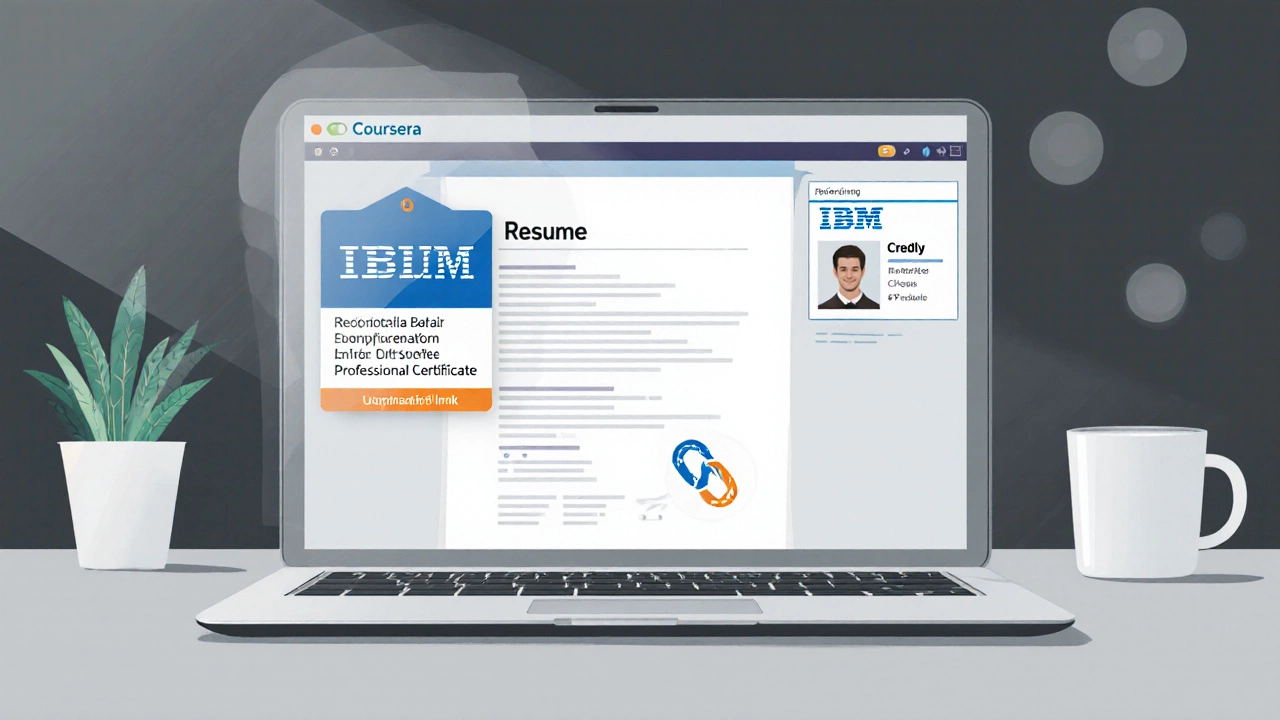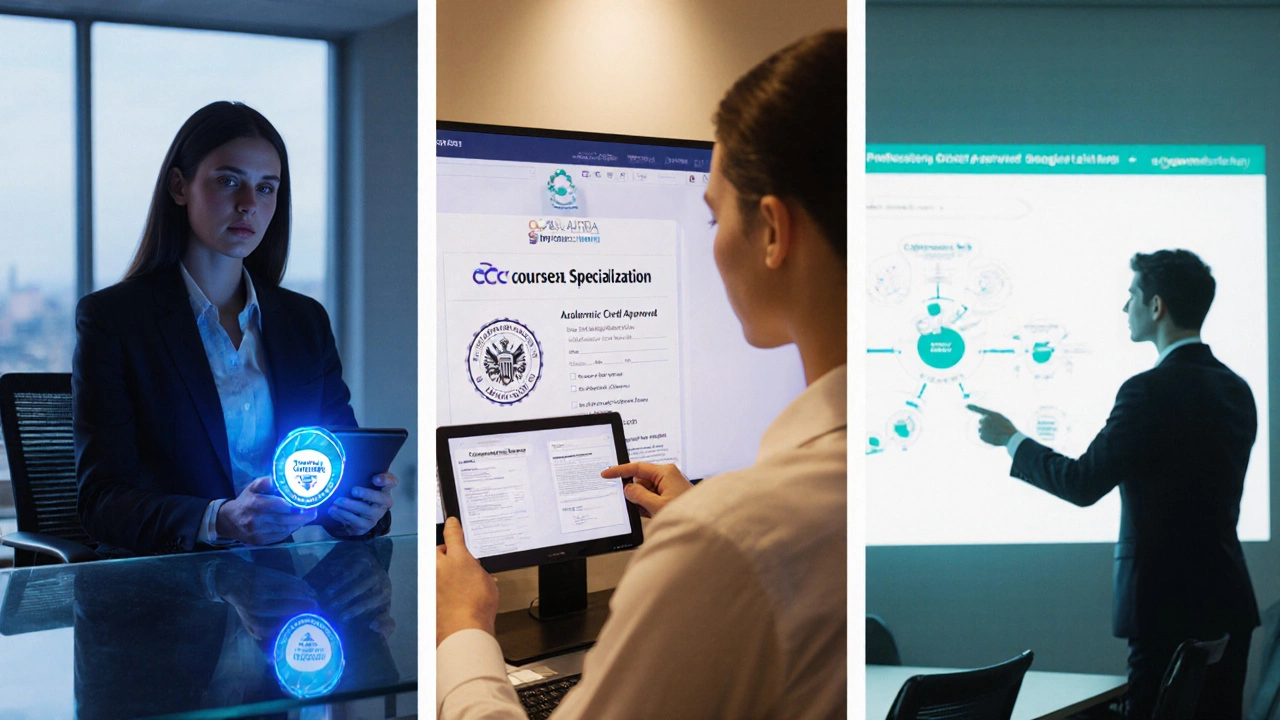Coursera Certificate Recognition Finder
Find Recognition for Your Coursera Certificate
Search for specific Coursera certificate programs to see which employers, universities, and professional bodies recognize them.
Results for
- University of Illinois Urbana-Champaign (online master's pathways)
- Arizona State University (credit-eligible MOOCs)
- University of London (BSc in Computer Science)
- Google (150+ employers list Google-backed badge as hiring criteria)
- IBM (valued for up-skilling)
- Meta (valued for up-skilling)
- AWS (valued for up-skilling)
- CompTIA (68% of tech recruiters consider industry-partner badges as "equivalent to a short-term bootcamp")
Wondering if a Coursera certificate will actually open doors? You’re not alone. Tens of thousands of learners finish a course every month and the next step is figuring out whether the credential means anything to hiring managers, admissions officers, or professional bodies.
In this guide we break down exactly what “recognition” looks like, which Coursera programs carry real weight, how to prove authenticity, and practical tips for turning a digital badge into a career boost.
What does “recognition” really mean?
Recognition can fall into three buckets:
- Employer acceptance: Recruiters see the badge and consider it comparable to a traditional credential.
- Academic credit: Universities count the course toward a degree or a continuing‑education requirement.
- Professional certification alignment: Industry bodies allow the Coursera badge to satisfy part of a licensing or certification pathway.
Each bucket has its own set of rules, partners, and verification methods.
Who decides if a Coursera badge is legit?
When you enroll, you’re actually signing up for a Coursera online learning platform that partners with universities and companies to deliver MOOCs. The platform itself doesn’t grant accreditation - that comes from the institutions behind the course.
Key players:
- Partner university a higher‑education institution that designs the curriculum and may award academic credit
- Employer network companies that have publicly stated they recognize specific Coursera credentials
- Professional body organizations that map Coursera courses to licensing requirements
- Credential verification service third‑party platforms like Credly that host and validate digital badges
Which Coursera certificates carry the most weight?
Not all badges are created equal. Below is a quick snapshot of the three main categories you’ll encounter.
| Type | Partner | Academic Credit? | Employer Acceptance | Typical Cost (USD) |
|---|---|---|---|---|
| University‑backed Specialization | University of Michigan, University of Illinois, etc. | Often transferable (up to 3 credits per course) | High - especially in tech and data roles | $39‑$79 per month |
| Google Career Certificates | No formal academic credit | Growing - 150+ employers list Google‑backed badge as a hiring criterion | $399 total | |
| Professional‑Level Course (e.g., IBM Data Science) | IBM, AWS, Meta | None | Medium - valued for up‑skilling but not a substitute for a degree | $49‑$99 per month |
How employers actually view Coursera badges
Recruiters are scanning hundreds of résumés, so the badge needs to stand out. Here’s what tends to catch their eye:
- Clear partner branding - a badge that says “University of Illinois - Data Science Professional Certificate” instantly signals academic rigor.
- Verification link - a URL that points to Credly or Coursera’s own verification page lets hiring managers click and see completion dates, grades, and instructor names.
- Relevant skill set - if the job posting lists “SQL, Python, Tableau”, a Coursera specialization covering those tools will be taken seriously.
Recent surveys (2024 CompTIA hiring study) found that 68% of tech recruiters consider industry‑partner badges (Google, IBM, AWS) as “equivalent to a short‑term bootcamp”.
Academic credit - can you stack Coursera courses into a degree?
Some universities have formal credit‑transfer agreements. The process usually looks like this:
- Complete the Coursera Specialization and earn a verified certificate.
- Request an official transcript from Coursera (available for a fee).
- Submit the transcript to the admissions office of the target university.
- The university evaluates the syllabus; if it matches an existing course, they award credit (often 3-6 credit hours).
Schools that regularly accept Coursera credits include:
- University of Illinois Urbana‑Champaign (online master’s pathways)
- Arizona State University (credit‑eligible MOOCs)
- University of London (BSc in Computer Science)
Keep in mind that credit acceptance is not guaranteed - each institution has its own policy and may require a minimum grade (usually 80% or higher).

Proving your badge is real
Fraudulent screenshots are a real problem. The cleanest way to demonstrate authenticity is through a credential verification service. Coursera partners with Credly digital badge platform that stores verified credentials and provides shareable URLs. When you earn a verified certificate, you’ll receive a “Share” button that generates a unique link.
Steps to add the badge to LinkedIn or a résumé:
- Log into Coursera, go to “Accomplishments”.
- Click the “Add to LinkedIn” or “Download PDF” button - both include the Credly verification URL.
- Paste the link in the “Licenses & certifications” section of LinkedIn.
- For a résumé, embed the QR code that Credly provides; recruiters can scan it on the spot.
Having the verification URL next to the badge tells employers you have nothing to hide.
Tips to make a Coursera certificate work for you
- Choose partner‑backed programs - those with university logos or major corporate names carry more weight.
- Target in‑demand stacks - data science, cloud computing, UX design, and AI currently top employer wish‑lists.
- Show results - add a short bullet on your résumé like “Built an end‑to‑end predictive model (Python, Scikit‑learn) as part of Coursera’s IBM Data Science Professional Certificate”.
- Pair with a portfolio - upload the project files to GitHub or a personal site and reference the Coursera badge in the project description.
- Leverage Coursera’s career services - many paid specializations include resume reviews and interview prep sessions.
Common pitfalls and how to avoid them
Even a great badge can fall flat if you miss the details:
- Skipping the verification step - a screenshot alone looks easy to fabricate.
- Choosing a non‑partner course - a random instructor‑only MOOC rarely offers credit or employer recognition.
- Not completing the course - many employers verify the completion date; a half‑finished badge raises red flags.
- Ignoring grade thresholds - some universities require a minimum score; aim for at least 85% to stay safe.
Plan ahead: read the partner’s credit policy before you enroll, and keep your verification links handy.
Bottom line - are Coursera certificates recognized?
Short answer: yes, but it depends on which badge you earn, who you show it to, and how you prove it.
University‑backed specializations can earn you academic credit and are viewed favorably by recruiters. Corporate‑partner certificates (Google, IBM, AWS) are increasingly listed as “preferred qualifications” in job ads. The key to success is picking the right program, completing it with a high grade, and sharing a verifiable badge.

Do all Coursera certificates count as a degree?
No. Only courses that are part of a university‑approved Specialization may be eligible for credit, and even then the credit must be approved by the receiving institution.
How can I prove a Coursera badge to an employer?
Use the verification link provided by Credly or Coursera’s own ‘Share’ button. Add the URL to the “Licenses & certifications” section on LinkedIn, or embed the QR code on your résumé.
Which Coursera certificates are most valued by tech companies?
Certificates backed by Google, IBM, AWS, and University of Illinois tend to appear most often in job postings for data analysis, cloud engineering, and AI roles.
Can I use a Coursera certificate for immigration points?
Generally not. Immigration authorities usually require accredited degrees or recognized professional qualifications, not a MOOC badge, unless the badge is part of a degree‑granting program recognized in your destination country.
What’s the difference between a “Specialization” and a “Professional Certificate” on Coursera?
A Specialization is a series of courses created by a university and may offer academic credit. A Professional Certificate is built with a corporate partner, focuses on job‑ready skills, and is often listed as a hiring requirement.
